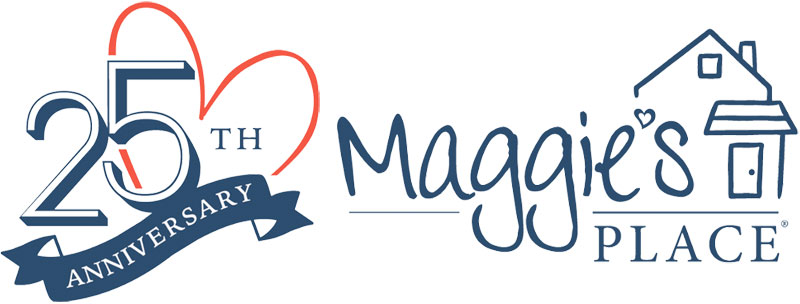Maggie’s Place operates on a set of core values: love, hospitality, community, and excellence. These values aren’t easy. In fact, they’re radical.
But radicality doesn’t entail impossibility. It just means we need grace.
As we inch closer to our 17 year anniversary on May 13, we’re celebrating some of the initial “yeses” that created Maggie’s Place. Let’s reflect on the words of Mary and Teresa, two of the five founders of Maggie’s Place…
Mary
My clearest moment of commitment to making the project a reality came when I made a phone call early on. I dialed a string of numbers to share my idea with Celina, a friend with a passion for social justice who had been a member of a weekly prayer and faith-sharing group in my college days. Her roommate, Teresa, answered and said that Celina wasn’t home. In my zeal, I responded to Teresa saying something along the lines of, “Well then, can I talk to you?” I didn’t know Teresa well, but I shared an overview of the hospitality house vision. She simply responded, “I’m in.” In less than ten minutes of first hearing about the project, she committed to making it happen. And when she said yes, there was no backing out for me—I couldn’t let it turn out to be just a crazy idea that would fade away. Teresa was counting on it becoming real; she was counting on me.
It was Maggie’s Place or bust!
In those early days, as I responded to God’s invitation to set things in motion, I wasn’t saying “yes” to seeing babies die in premature births. I wasn’t saying “yes” to conflict between staff members, to worrying about money, or to having my character regularly called into question. I was barely saying “yes” to the stress of creating community with women who have experienced trauma, mental illness, and abuse. I hadn’t even contemplated the long-range plan of Maggie’s Place for the future.
I certainly wasn’t saying “yes” to going through a staff member’s belongings after she was killed in a car accident, or standing on the lawn taking a verbal beating from an angry neighbor. I wasn’t saying “yes” to insurance claims, to a mountain of women’s clothes, to worrying about a mom who didn’t come home, or to saying goodbye to a mom who was leaving to have an abortion. God, in His goodness, knew that in the scant and idealistic faith I held in that early stage, I wasn’t capable of those yeses.
Teresa
A year before the big phone call, I would never have suspected that I would be moving to Phoenix to pursue something that didn’t even exist yet with a group of women I hardly knew. But that, to me, is what God can do when you give Him a fair chance at your life. Being open, I think, is a lot about taking completely unexpected options seriously. God is always creative, and therefore, always unpredictable. I’ve always struggled with a desire to know what the future is going to be like, and being open to God’s will has been an act of surrendering this desire. I am challenged to recommit to it all the time!
A year earlier, I would have told you that Phoenix was the never-ending city I drove through to get from Tucson to Flagstaff, and the only good thing about it was that it had gas stations. I would have looked at you skeptically if you suggested that I would voluntarily choose to live in that concrete jungle with its scorching temperatures, busy freeways, and nothing beautiful.
Instead, the Phoenix I found was teeming with life. It was a place where anything could happen because it was the place where—from nothing but a dream—Maggie’s Place came to be. It was the place where the Holy Spirit worked miracles in my heart and the hearts of many others. It is the place where a dream has blossomed and touched countless lives, and has grown into something bigger than any of us. Because I said yes, I bore fruit and was changed forever.
I couldn’t have imagined all that Maggie’s Place would one day be, but the ideals it was built on were what I gave my yes to. My first yes was to the idea that it could be done. My ensuing yeses were confirmations and recommitment to all we had talked about: solidarity with the poor, the belief that God would bless this work, the interdependence that true community demands, and living wholly dependent on divine providence. I would later learn that I was also saying yes to many tears, personal sacrifice, painful purification, overwhelming frustration, and frequent humiliation. But these yeses came later—when they had to—and God always provided the strength needed to persevere.
My openness to Maggie’s Place led me to discover, with greater depth, who I am. It brought me into contact with people and situations that fed me, challenged me, and grew me. I am so grateful that I am not fully (or even mostly) in charge of planning my life; my version would have been infinitely boring, despite all my best intentions.
Excerpts taken from Maggie’s Place: Building a Community of Love.
